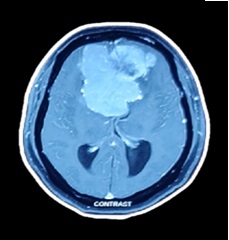
Timely Diagnosis and Treatment of Brain Tumors: A Case Study at Aster RV Hospital
In a recent case at Aster RV Hospital, the critical importance of early diagnosis and treatment for brain tumors was vividly illustrated, underscoring how prompt intervention can dramatically improve a patient's quality of life and bring relief to their loved ones.
Patient Radhika (name changed), a 47-year-old woman, initially presented with a range of troubling symptoms over several months. Her husband noticed her experiencing memory impairment, mood swings, and reduced speech output. Additionally, Radhika suffered from hallucinations, weight gain, excessive sleep, intermittent headaches, and urinary incontinence. Concerned, she sought help from a psychiatrist, suspecting a psychiatric cause. Upon evaluation, however, it became clear that her symptoms stemmed from an organic issue, prompting a referral to the neurosurgery department.
An MRI revealed a sizable tumor, measuring between 7 to 8 centimeters, originating from the meninges—the brain's protective membrane. This meningioma was exerting pressure on Radhika's frontal lobes, resulting in a condition known as bi-frontal dysfunction. The frontal lobes play a pivotal role in executive functions and decision-making, and their impairment can lead to significant personality changes and psychiatric symptoms.
Radhika's husband expressed his concern, stating, "My wife exhibited low mood, urinary incontinence, reduced speech output, and memory impairment, alongside headaches. She seemed aloof and avoided social interaction. We suspected depression or another psychiatric issue and sought help from a psychiatrist. However, further evaluation revealed an organic cause—a tumor pressing on her brain's frontal lobes."
Dr. Aniruddha Tekkatte Jagannatha, Consultant Neurosurgery at Aster RV Hospital, elaborated on the implications of such tumors, stating, "Tumors like meningiomas or gliomas affecting the frontal lobes can manifest as mood changes, abnormal behavior, and personality shifts. These symptoms are often misdiagnosed, delaying appropriate treatment."
Radhika underwent a successful bifrontal craniotomy, guided by advanced navigation and tumor fluorescence technology. This precise approach allowed surgeons to completely remove the tumor. Remarkably, within a week of the surgery, Radhika showed significant improvement and returned to her normal self, much to the joy and relief of her family.
Dr. Aniruddha emphasized the importance of early detection and comprehensive treatment planning in managing brain tumors effectively. "Radhika's case demonstrates how timely medical intervention can lead to remarkable improvements in health outcomes, enabling patients to reclaim their normal lives."
Advances in neurosurgery techniques and technology have streamlined brain tumor surgeries, making them less invasive and more precise. Technologies like neuro-navigation act as a GPS for the brain, while tumor fluorescence, cortical mapping, and intraoperative neuro monitoring ensure that only the tumor is removed, preserving healthy brain tissue and minimizing complications.
"While successful removal of benign tumors like meningiomas often leads to a full recovery, long-term follow-up with a neurosurgeon is essential," Dr. Aniruddha added.
Radhika's journey underscores the critical importance of awareness, early diagnosis, and specialized care in treating brain tumors. Her recovery stands as a testament to the life-saving impact of prompt medical intervention and underscores the importance of proactive health management in such conditions.